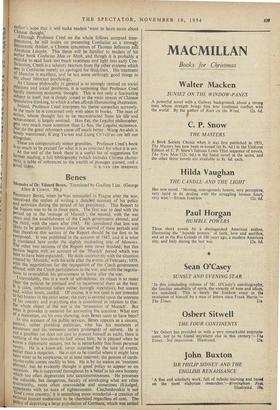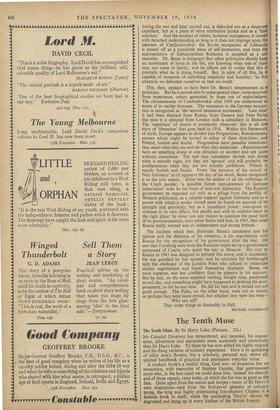Benes
Memoirs of Dr. Eduard Benes. Translated by Godfrey Lias. (George Allen & Unwin. 30s.)
PRESIDENT BENES, when hewas reinstalled in Prague after the war, conceived the notion of writing a detailed account of his policy and activities during the period of his presidency. This Report to the Nation was to be in three parts. The first was to deal with the Period up to the 'outrage of Munich'; the second, with the war the and the establishment of the Czech government abroad; and me third, with the years after 1945. He considered that less was
to be generally known about the second of these periods and that therefore this section of the Report should be the first to be O nposed. It was published in the autumn of 1947, and it is what 's translated here under the slightly misleading title of Memoirs. The other two sections of the Report were never finished; but this later begins with an account of the 'Munich' period which was utter to have been expanded. He deals successively with the situation created by 'Munich,' with his exile after the events of February, 1939, with the negotiations for the recognition of the Czech government abroad, with the Czech participation in the war, and with the negotia- tions to re-establish his government at home after the war.
Unavoidably, this is a work of self-defence; its object is to make Blear the policies he pursued and to recommend them as the best. It is calm, unhurried (often rather boringly repetitive); but sincere and, within limits, candid. Of course, it is not (and is not intended to be) history in the strict sense; the story is centred upon the interests of his country and everything else is considered in relation to this: the whole object of the war is the 'revocation of Munich'. But What it provides is material for answering the question: What sort of a statesman, on his own showing, does Benes seem to have been? In this account of his public services, Benes appears as a sincere, Patient,. rather plodding politician, who has his moments of astuteness and his moments (often prolonged) of naivete. He is not a gambler (or does not care to present himself as such), there is nothing of the too-clever-by-half about him; he is pleased when he scores a diplomatic success, but he is remarkably free from personal vanity. He is a know-all, never surprised by the turn of events, rather than a magician. He is apt to be trustful where it might have been wiser to be suspicious, or at least reserved; the gesture of cards- on-the-table comes readily to him. He is by no means an 'innocent abroad,' but he evidently thought it good policy to appear so on occasion. He is supported throughout by a belief in his own honesty which .too often degenerates into sanctimoniousness. He possesses the valuable, but dangerous, faculty of enveloping what are often trustworthy, more often unavoidable and sometimes ill-judged, expedients with an aura of righteousness. Czechoslovakia is not Cod's own country,' it is something more wonderful—a creation of rational human endeavour to be cherished segardless of cost. The MicY of deporting a large population of Germans, which was settled during the war and later carried out, is defended not as a desperate expedient, but as a piece of stern retributive justice and as a 'final solution.' And the conduct of others, however outrageous, is viewed with detached understanding so long as it does not impinge upon the Interests of Czechoslovakia: the Soviet occupation of Lithuania is passed off as a justifiable piece of self-protection, and even the appropriation of Subcarpathian Ruthenia is accepted as a sad necessity. Dr. Benes is indignant that other politicians should keep an assortment of irons in the fire, not knowing when one of them may not come in handy; and he affects not to notice that this if precisely what he is doing himself. But, in spite of all this, he is capable of moments of refreshing simplicity and humility: 'in this situation we defended ourselves as best we could.'
This, then, appears to have been Dr. Benes's temperament as politician. But he is moved also by some general ideas; some acquired from experience, others generated by hope out of make-believe. The circumstances of Czechoslovakia after 1939 are understood in terms of its earlier fortunes. The resistance to the German occupa- tion is recognised as 'the second resistance movement.' Last time it had been directed from Russia, from Geneva and from Paris; this time it is directed from London with a subsidiary in Moscow. The 'repetition' of events is constantly observed: this is all one story of 'liberation' that goes back to 1914. Within this framework of myth, Europe appears as divided into Progressives; Reactionaries; powers which might be turned in either of these directions; and Poland, foolish and feudal. Progressives have peaceful intentions; they mean what they say and do what they undertake. IReactionaries have an upsetting drang in one direction or another and are quite without, conscience. The rest may sometimes deviate into doing what is morally right, but they are 'egoistic' and will probably be pusillanimous when they are not actually perfidious. Poland is merely foolish and feudal. From 'the moment of the arrival of Nazi Germany' to (it appears) the day of his death, Benes recognised it as the only enemy. Hitler was the author of all the sufferings of the Czech people; 'a possible future recrudescence of German imperialism' must be the focus of post-war diplomacy. The Russian government he regarded not only as a refuge from the perfidy of Western politicians, as a reliable support against Germany and as a power with which a modus vivendi must be found on account of its strength and proximity, but as a beneficent power; over-given to violence in its own affairs, but pacific and with its socialist heart in the right place: he never saw any reason to question the good faith of its pronouncements, even when Stalin told him, in 1943, that what Russia really wanted was an independent and strong Poland.
The incident which best illustrates Benes's astuteness and his naiveté and the dilemma of his situation, is his negotiations with Russia for the recognition of his government after the war. Ho saw that if nothing were done the Russians might set up a government composed of Czechs who spent the war in Moscow. His visit to Russia in 1943 was designed to prevent this move, and it succeeded. He was gratified by this success, and he contrasts his forethought with the obstinacy of the London Poles who refused to undertake similar negotiations and found themselves displaced. Belles, we must suppose, was less confident than he appears in his account. But he had, on the most sceptical reading, bought time, postponed an evil day, and something might have happened to prolong the post- ponement; so far he was wise. He did his best and it turned out not good enough. The Poles, on the other hand, were not so astute, or perhaps they were more proud; but whether they were less wise—
Who can tell?
They order things so damnably in Hell.
MICHAEL OAKESHoIT











































































 Previous page
Previous page